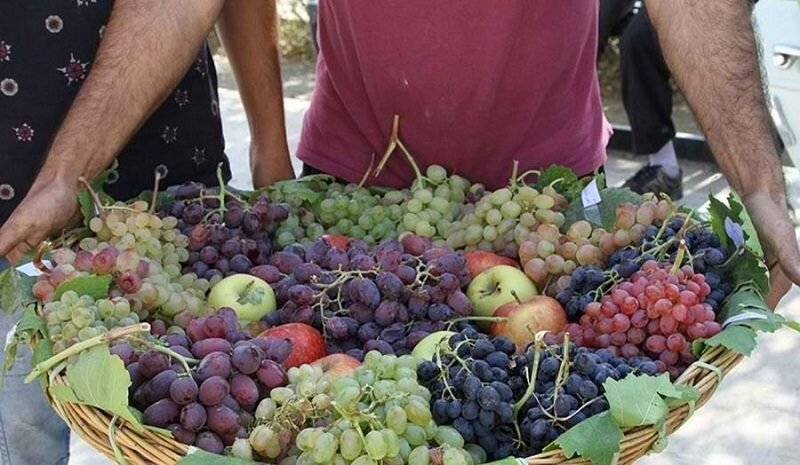
TEHRAN–Hazaveh village in Arak, Markazi province, is one of the most prominent destinations for rural tourism.
Hazaveh, with its grape orchards, unique grape syrup making, authentic historical texture, and cultural festivals, is on its way to becoming a global brand and is ready to attract the domestic and foreign tourists, ISNA reported.
Head of Markazi Cultural Heritage, Tourism, and Handicrafts Department Mahmoud Moradi Naraqi said that Hazaveh village is considered one of the key tourist villages in Markazi province due to its unique combination of history, culture and nature.
Hazaveh village is the birthplace of Mirza Taghi Khan Farahani, who gained his nickname ‘Amir Kabir’ from his noticeable administrative, cultural, and economic reforms and served as the prime minister under Qajar King Naser al-Din Shah.
This capacity, along with the region’s lush grape gardens, high-quality syrup production and valuable historical texture, has made it a unique destination for tourists. Many domestic and foreign tourists are interested in seeing the birthplace of a personality like Amir Kabir, just as Khomein has been noted for being the birthplace of the late Imam Khomeini.
Stating that visiting the birthplaces of prominent figures is common in global tourism, he stated that Hazaveh has the potential to become an international destination with the historical house of Amir Kabir, a great and influential figure in Iranian history, pristine nature, and local rituals.
He considered Amir Kabir’s birthplace the most important feature of this village, and stated that Amir Kabir’s historical house is one of the most important attractions of Hazaveh, which is known as a symbol of the cultural identity of this village.
Moradi Naraqi advised families, especially parents, to take their teenagers to Hazaveh to familiarize them with the living atmosphere and thoughts of this great figure by visiting Amir Kabir’s house in this village.
Despite his fame, Amir Kabir is still unknown to the younger generation in terms of his cultural depth and insight, while he can be an inspiring role model for them, he added.
He pointed to the historical texture and authentic architecture of this village as another feature and said: “Hazaveh has a valuable traditional texture and rural architecture that must be preserved. Unfortunately, the uniformity of facades and the use of gable roofs with inappropriate colors threaten the identity of the village. Tourists are looking for authenticity and expect a rural texture to maintain its unique color, smell, and even sound.”
He listed the presence of vineyards and syrup making as other features of Hazaveh and added that Hazaveh’s lush vineyards and the grape festival, which are registered in the National Festival Calendar of the Ministry of Cultural Heritage, are key advantages of this village.
He stated that Hazaveh syrup, which is a by-product of grapes, has become a national brand due to its quality and special processing method, and has even surpassed provincial competitors.
“This product attracts tourists to Hazaveh as a cultural and economic attraction. The Grape and Syrup Festival, whose registration plaque was unveiled last year, is held every year to introduce Hazaveh as a destination for agricultural tourism.”
Referring to the success of Hazaveh syrup in the market, Moradi Naraqi said: “Hazaveh syrup has become a reputable brand due to its distinctive quality and is even known in neighboring provinces. Markazi Cultural Heritage Department is working with responsible institutions to preserve the authenticity of Hazaveh syrup.”
He added: “Although the production of agricultural products such as grapes is related to the Agriculture Ministry, when the production of these products is transformed into tourism events, Cultural Heritage Department also comes into play. Other villages in the province also have grapes, but the quality and style of processing Hazaveh syrup have distinguished it.”
Moradi Naraqi emphasized the role of tourism in the sustainable development of Hazaveh, saying that tourism can create high value added for the gardeners and residents. When tourists come to Hazaveh, agricultural products such as grapes and syrup gain more value, and this helps the local economy, he added.
He also pointed to the village’s ecotourism and cultural rituals as another advantage, saying that ecotourism accommodations and various local ceremonies, such as Muharram mourning or rituals related to the anniversary of Amir Kabir’s appointment as the chancellor of Iran on October 20, have turned Hazaveh into a multifaceted destination.
Moradi Naraqi also called on local communities to contribute to the region’s economy and culture by welcoming tourists and contributing to tourism development, and stated that with the cooperation of people, institutions, and strengthening infrastructure, this village can play a key role in the sustainable development of Markazi province and attract the global tourists.
He added that educating the local communities and tourists is the key to success. Tourists must observe environmental requirements, such as avoiding littering or lighting fires, and customs, such as wearing appropriate clothing, he pointed out.
KD
Disclaimer : This story is auto aggregated by a computer programme and has not been created or edited by DOWNTHENEWS. Publisher: tehrantimes.com






